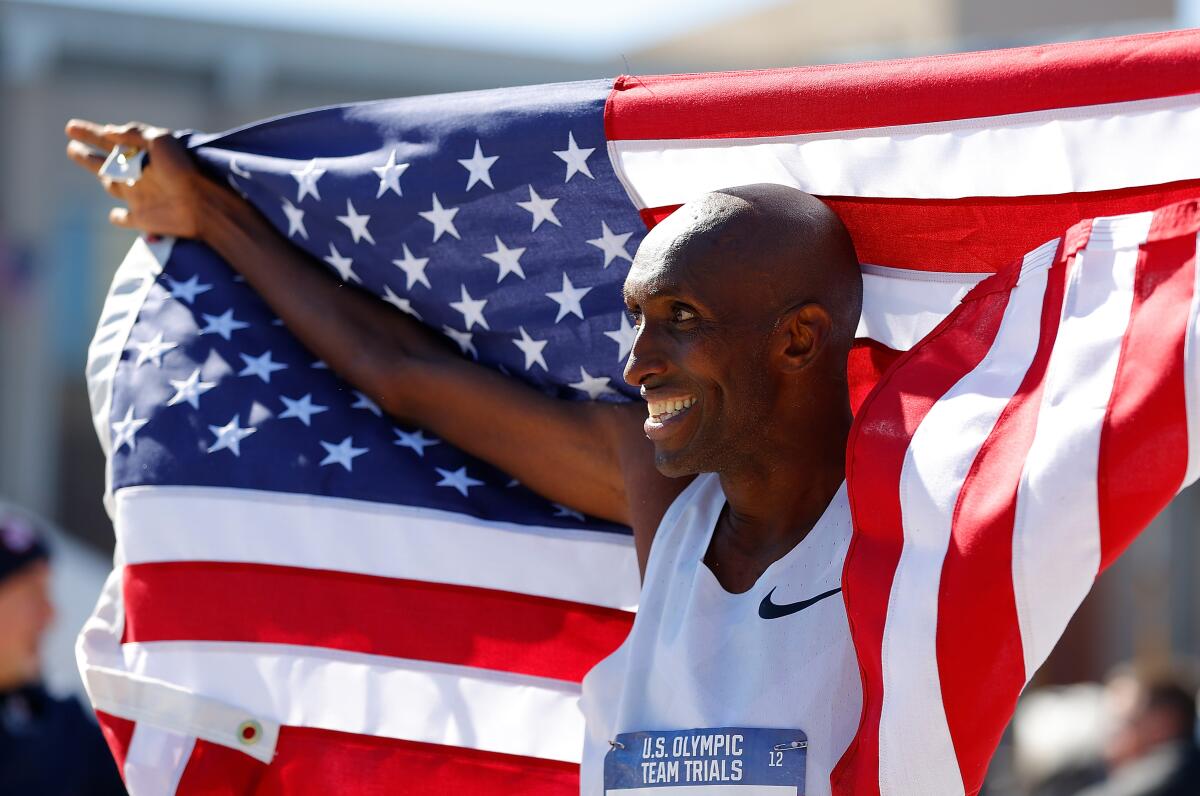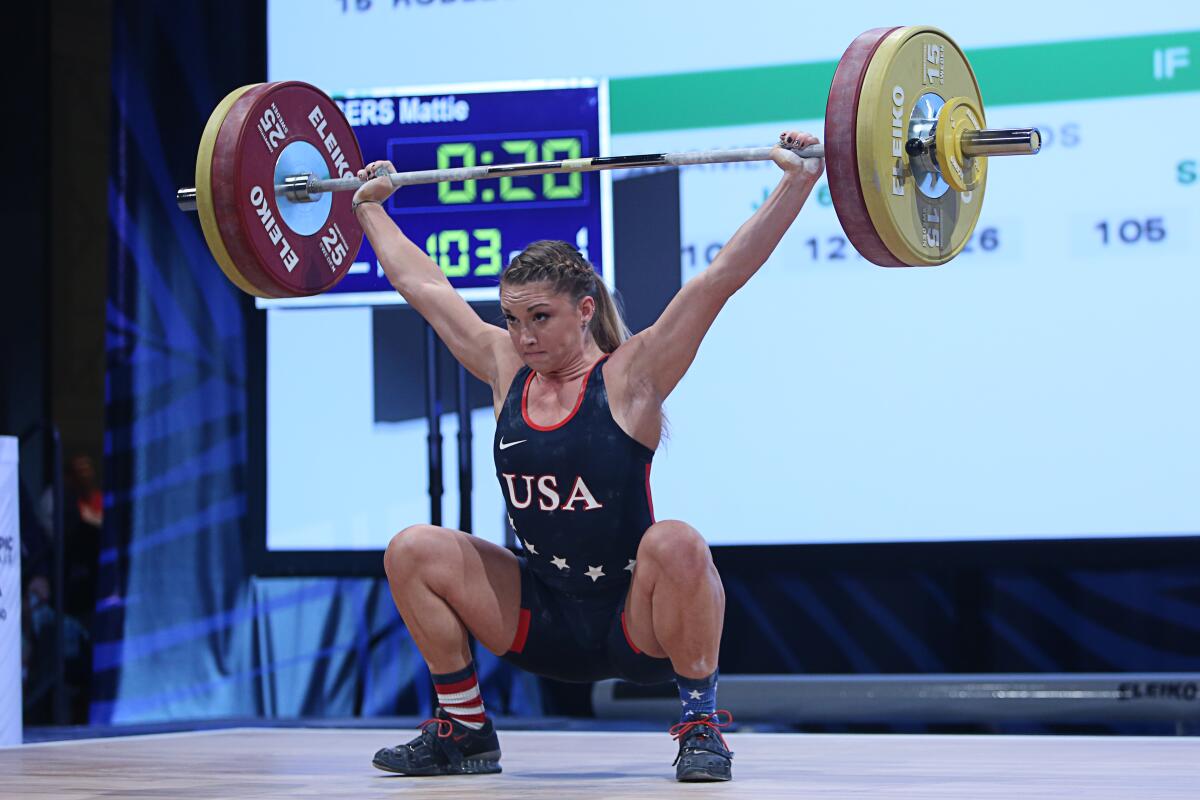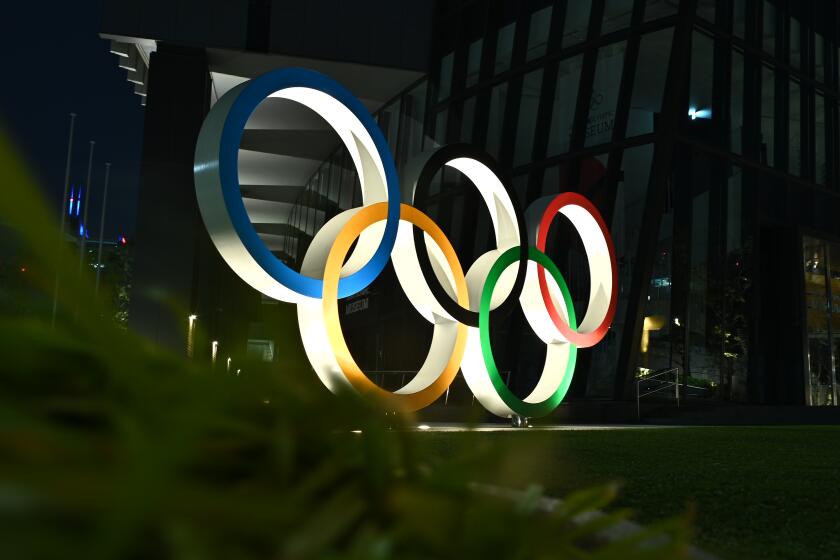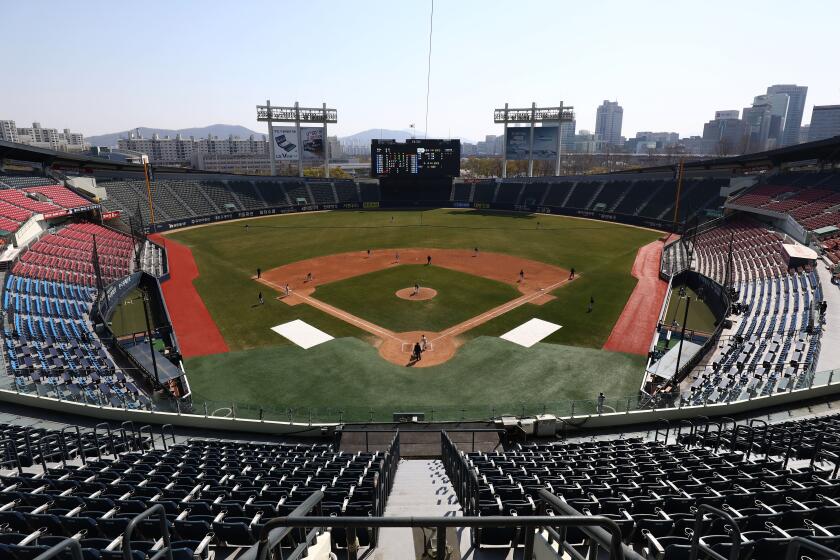Olympic hopefuls try to arrange new training regimen amid coronavirus outbreak
- Share via
The garage floor was a problem. It slanted so much that whenever Mattie Rogers finished with a lift and dropped the barbell — we’re talking a lot of weight — the thing started rolling away.
Training in a makeshift gym at home, with a squat rack next to the washer and dryer, Rogers tried everything to even the surface.
“Various levels of carpet,” she said. “I put some grocery bags under the mat to make a speed bump.”
These crude conditions don’t exactly befit a world-class weightlifter, but with gyms around her Florida hometown shuttered because of the coronavirus, Rogers has no choice.
Elite competitors around the globe have voiced support for postponing the 2020 Summer Games in Tokyo because of the COVID-19 pandemic. They know it was the right decision and they like that the International Olympic Committee has quickly set a new date, pushing the Games and ensuing Paralympics back a year.
But athletes at that level tend to operate on meticulous schedules, so the pandemic has thrust them into a starkly different reality.
No one knows when tracks, pools and weight rooms will re-open. The resumption of competition — crucial to mental preparation and honing a sharp edge, if not qualifying for the Games — also remains up in the air.
That’s why Rogers and others like her are scrambling to adapt. The 24-year-old recently got to work in the house she rents, laying plywood under cushioned mats and stacking weights against the wall.
“I’m just going to train as much as I can,” she said. “I want to be sure I’m ready no matter what.”
::
Not everyone is trying to keep themselves in shape during this time of shelter-in-place.
Open-water swimmer Haley Anderson usually takes a break in late August or September, giving her body a chance to rest. This annual respite has been forcibly shifted into springtime.
“I’m treating it as one of the worst vacations ever,” she said. “Just staying in my apartment.”
Anderson has an advantage: She earned a spot on the U.S. Olympic team by taking silver in a 10-kilometer race at the world championships last July. Her trip to Tokyo is guaranteed because the IOC has decided to honor all previous qualifications.
“We’ve tried to provide certainty in all of the decisions,” said Kit McConnell, the IOC’s sports director.
But only 57% of the approximately 11,300 available slots for the 2020 Summer Games have been claimed; thousands of athletes still need to make their national teams.
Chari Hawkins was hoping to grab her spot at the U.S. track and field trials in June. The heptathlete had been on a roll, rising from 21st to fourth in the nation in two years. Now, she says, “I’m wondering if my season is over.”
Her schedule for this year was supposed to intersperse competition with periods of training and rest. Hawkins has been talking with her coach about what to do next.
The International Olympic Committee is not commenting on what might happen to the Olympic Games if the coronavirus remains a problem next year.
It would be useful to spend this downtime building strength for an event that requires running, jumping and throwing but, like Rogers, she doesn’t have any gyms open near her home in San Diego.
“I’m sitting here with 10-pound dumbbells and a medicine ball,” she said. “I can’t just slam the medicine ball for eight hours.”
Also, the international track federation hopes to stage special, one-day meets as soon as the coronavirus subsides. Without knowing when that might happen, Hawkins worries about embarking on a heavy lifting schedule, then jumping abruptly into competition.
“That’s how people get injured,” the 28-year-old said. “That’s how they get burned out.”
Even for long-distance runners, who can continue with much of their usual regimen, the uncertainty surrounding postponement takes a mental toll. These are young men and women accustomed to living step-by-step, always pointed toward the next big event.
Marathoner Abdi Abdirahman has found his long practice runs in Flagstaff, Ariz., harder to manage.
“If I was to tell you everything is normal, that I’m approaching training as normal, as if everything was perfect in the world, I would be lying,” said the 43-year-old American who qualified for Tokyo in February. “Getting motivated is very tough.”

His angst makes sense to Anita DeFrantz, a longtime IOC member from Los Angeles who experienced something similar when she was an Olympic rower, waiting for the U.S. government to decide on boycotting the 1980 Moscow Games.
Some of her teammates eased back on their preparations. DeFrantz recalls using coffee tins filled with concrete to keep up with her workouts.
“We just kept going for as long as we could,” she said of the weeks before the boycott became official. “You do what you have to do.”
At an elite training center in Chula Vista where they live, Paralympians David Brown and Jerome Avery have taken this approach, devising new ways to maintain social distance while working out.
Brown is a blind sprinter and Avery is his guide runner. As the defending gold medalists at 100 meters, they normally race side-by-side, grasping a four-inch tether between them.
Now, when they run laps on the track, Avery stays several feet ahead, calling “here, here” over his shoulder. Speedwork gets done on an open field with Avery standing at one end, clapping his hands, while Brown hurtles toward him.
“David is good at moving toward the sound,” Avery said. “But it’s a little nerve-wracking.”
Brown said, laughing, “The grind never stops.”
A look at how sports leagues, including the NFL, MLB, MLS, NBA and NHL, are responding to the coronavirus outbreak.
::
The postponement of the 2020 Summer Games might ultimately help some athletes, especially the younger ones. Swimming coach Jon Urbanchek, who works with 18-year-old phenom Regan Smith, said: “One year makes a heck of a lot of difference.”
At the other end of the spectrum, older athletes have decisions to make. Soccer player Carli Lloyd, who is 37, plans to stick around for one more shot at the podium; other veterans might decide to move on with their lives.
That could include such big names as gymnast Simone Biles and tennis star Roger Federer. The Tokyo Games could lose substantial marquee value.
“Look, we’re in touch with a number of athletes,” McConnell of the IOC said. “Obviously there are athletes at different stages of their careers.”
For the U.S. weightlifters, postponement raises another complexity.

Shortly after the pandemic hit, their sport decided to cut the Olympic qualification process short, awarding spots to the top athletes at that point. But in the chaotic days since, some of the spots have yet to be officially confirmed.
In a somewhat vague statement issued this week, the IOC said only that it has “urged the federations to find a balance ‘between protecting those athletes who were close to qualifying based on the previous 2020 deadlines and also ensuring the best athletes at the Olympic Games’ by taking into consideration performances in 2021.”
So the Americans say they remain unsure of their status. Will the abridged results stand when coronavirus restrictions are lifted? Or will everyone have to go back and finish the canceled events?
“Of course we’re going to feel uneasy about that,” said Katherine Nye, a reigning world champion from Michigan. “But I understand that it’s a fair argument both ways.”
Rogers was less diplomatic.
Four years ago, she missed making the U.S. team on her last clean-and-jerk, losing out on a trip to the Rio de Janeiro Olympics. The disappointment still drives her.
Grunting with each rep, she finished off a recent workout in her garage with a set of squats. In this time of pandemic, so much undecided, the possibility of having to re-qualify weighs on her mind.
“I’d hate it,” she said. “But I’ll be prepared.”
At least the garage floor is finally level.
Times staff writers Andrew Greif and Nathan Fenno contributed to this story.
More to Read
Go beyond the scoreboard
Get the latest on L.A.'s teams in the daily Sports Report newsletter.
You may occasionally receive promotional content from the Los Angeles Times.










